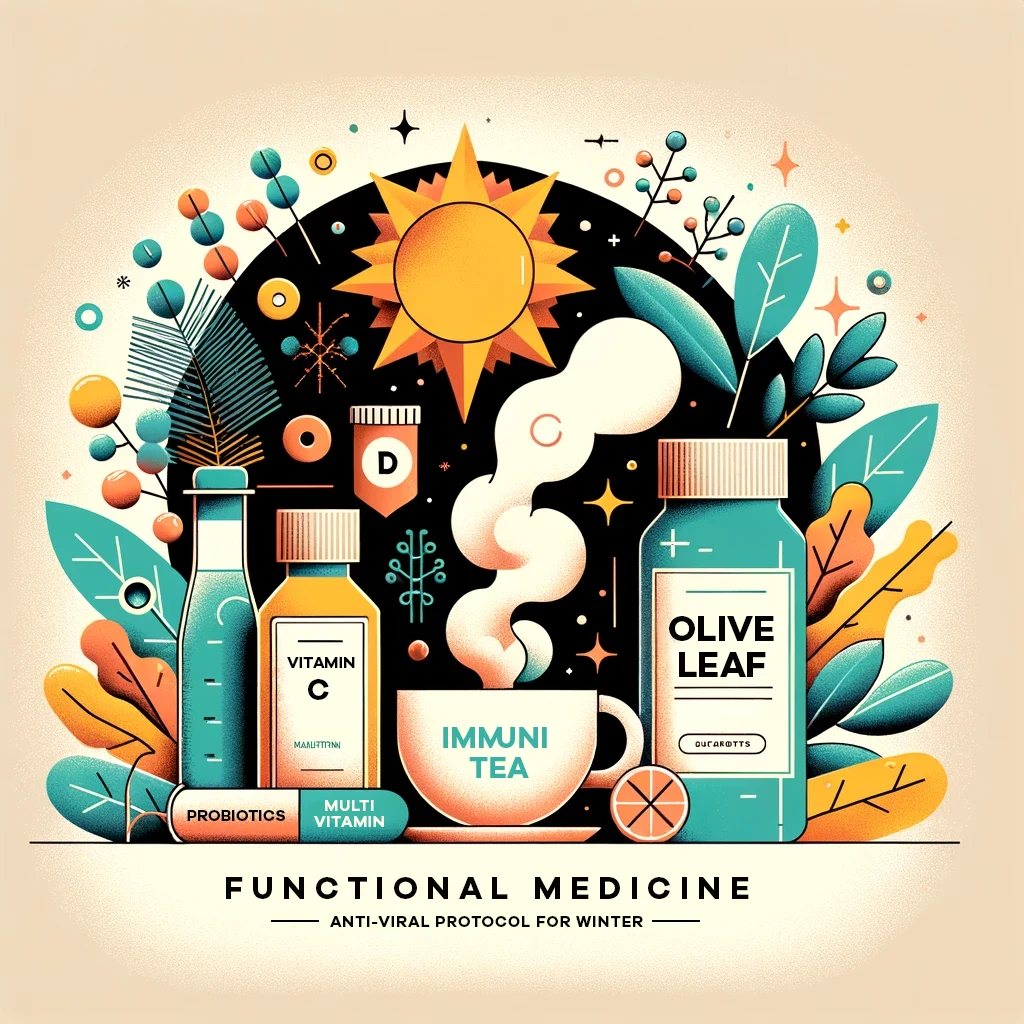As the temperatures drop and winter approaches, many of us become more susceptible to catching viral infections like colds and flu. This winter, instead of just hoping you don’t get sick, why not take proactive steps to boost your immune system and fend off illness?
In this post, I’m sharing my anti-viral protocol – a combination of supplements and healthy habits that will prime your immune system and help shut down infections after they take hold. Drawing on the latest research, I’m sharing the vitamins, minerals, herbs, and other immune-boosting compounds that work to support immune function.
Prep phase: prime your immune system
- Light up your day
Start with getting a metabolic boost first thing in the morning with sunlight. Use a SAD lamp as soon as you wake up, to stimulate neurotransmitters (dopamine and serotonin) which will boost your mood, energy and immune system. The lamp needs to provide 10,000 lux at a minimum distance of 20 centimetres away from your eyes for at least 30 minutes, please don’t wear glasses or contact lenses during this therapeutic 30 minutes. I leave both of my SAD lamps on til 4pm – yes my SAD is so bad that I need two lamps. - Stay cool
Your body is relying on you staying slightly cold to power your metabolism, so wear one less layer than you would need to to keep you quite warm, and don’t over do it with the heating at home. - Take vitamin D
Vitamin D is well known for it’s ability to keep the immune system fighting fit. Vitamin D enables the white cells of the lungs – the first line of defence against respiratory infections – to make antimicrobials that kill bacteria and viruses directly. It also tweaks the activity of other immune cells, which orchestrate longer-term immune responses. People with low levels of vitamin D are at greater risk of viral respiratory tract infections such as the flu.
Vitamin D has been shown to reduce the risk of some of the severe complications associated with Covid. Recent research shows that people with the lowest vitamin D levels had the highest risk of death and severe complications. Vitamin D appears to reduce levels of a biochemical that causes inflammation which is associated with the severe breathing difficulties seen in the disease. Vitamin D also changes the availability of the same ACE2 receptor on lung cells that Covid uses to gain entry to these cells and establish an infection. If vitamin D has already altered these receptors, then it may make it harder for the virus to gain a foothold in the body.
Vitamin D is a common nutrient deficiency and is essential for fertility, pregnancy, and lactation. A vitamin D deficiency can contribute to irregular menstrual cycles, period pain, back pain and premenstrual tension. If you’re finding that your periods are more troublesome in the winter, a low vitamin D level can be the culprit. In pregnancy, a vitamin D deficiency can increase the risk for preterm birth, postpartum depression, pre-eclampsia, and gestational diabetes in the mother, and childhood asthma, eczema, and autoimmune conditions in the child – so if you’re pregnant or breastfeeding in the winter make sure your vitamin D is at a good level.
Testing vitamin D levels is essential to dose supplementation, as most of us won’t be able to maintain optimal levels through food alone. The standard range of vitamin D in blood testing is reported as adequate over 75, with additional benefit 90 -100 nmol/L. From a health optimising perspective, the functional medicine range is 125 – 150 nmol/L. I regularly see clients with levels as shockingly low as 40, and all improve their health with vitamin D supplementation. If you would like to know more, please subscribe to my online course, Blood Test Results Decoded.
When choosing a vitamin D supplement, pick one that is mixed with oil because vitamin D is a fat soluble hormone which means it needs fat to be absorbed. Many supplements on the market are watery sprays or compounded tablets – these are unlikely to be effective. See below for my favourite supplement. In general I dose vitamin D at 2000-4000IU in the summer and 6000 – 8000IU in the winter. You would need to test your vitamin D level for a personalised dosing approach, so let me know if you would like help with that. - Take a good multivitamin
The immune system needs a constant supply of a wide variety of vitamins and minerals to provide strong defences and unfortunately the nutrition provided by supermarket foods can be woefully inadequate due to the poor quality soil that plants are grown in, and the poor quality feed that animals are fed. A good quality multivitamin is insurance against nutritional deficiencies, and can provide the minerals and vitamins that the immune system relies on, including:- vitamin B complex: B1, B2, B3, B6 (25mg of each daily) B12 and folate
- Zinc (15-30mg per day)
- Manganese
- Selenium
- Vitamin C
- Vitamin E
- Take β‐glucan
β‐glucans are fibres found in a variety of foods including oats, barley, seaweed, as well as many types microorganisms (bacteria, yeast and fungi). They are shown to be involved in training the immune system to resist invaders as well as reduce viral infection, reduce lung tissue damage, as well as improving mood and reducing stress in women.
There are different types of β‐glucan: ones derived from oats help to reduce cholesterol and improve cardiovascular markers, whereas the ones derived from bakers yeast support the immune system. Be sure to buy the right one (see below). - Have cup of Immuni-Tea a few times a week
It’s packed with anti-virals and immune support for every stage of viral infection, it can nip infections in the bud before they can take hold.
Kill phase: shut down infections
If you succumb to a viral infection, you can support your recovery with these recommendations:
- Add 2 teaspoons of vitamin C (ascorbic acid), 1 tablespoon of glycine powder and 1 teaspoon of acacia powder to 1.5 litres of water and drink throughout the day. Vitamin C is a well known immune system booster and anti-inflammatory, glycine is a protein that helps to prevent chronic inflammation and acacia powder is fibre beloved by the gut microbiome.
- Increase your β‐glucan dose to 2 capsules twice a day.
- Enhanced zinc lozenges are the “ace up your sleeve” when it comes to enhancing your immune system and these contain a special ionic zinc that can defend vulnerable membranes in your mouth, nose, and throat. They should be taken at the first signs of illness and just a few – up to 6 a day – are enough to completely reverse sore throats and inflammation. They are not meant to be used every day, only when you need them.
- Olive leaf liquid can provide good anti-viral defence.
For Covid infections, 1 tablespoon can be taken every 3 hours until symptoms subside, otherwise 1 tablespoon 3 times a day is beneficial. - Infection with Covid has shown to severely deplete a subset of bacteria in the gut that degrade histamine, leading to histamine overload. This typically shows up as fatigue and brain fog after eating, having stuffy nose or stuffy head, headaches or migraines, skin irritation and period issues amongst other things. Supplementing with probiotics that degrade histamine can help with this. Take care when choosing probiotics as some bacteria are histamine producers and can make you feel worse.
- Have a cup of Immuni-Tea every day, it is packed with anti-virals and anti-inflammatories. For an extra boost pop a cube into chaga mushroom tea.
Resources
- SAD lamp: the Beurer TL45 Perfect Day Daylight Therapy Lamp provides 10,000 lux at 20cm
- Vitamin D: Bio-d-mulsion Forte by Biotics (only available to practitioners – please contact me if you would like to buy it and get the right dosage for you)
- Multivitamin: Adult Multivitamins by Biocare
- β‐glucan: Bio-glucan plus by PharmaNord
- Vitamin C: Vitamin C powder by Peak Supps
- Glycine: Glycine powder by Peak Supps
- Enhanced Zinc Lozenges by Life Extension
- Olive leaf: Olive Life by Comvita
- Anti-histamine probiotics: ProbiotaHistaminX by Seeking Health (only available to practitioners – please contact me if you would like to buy it and get the right dosage for you)
While you can never guarantee you won’t get sick, arming yourself with the right immune-boosting strategies can help tilt the odds in your favour.


























